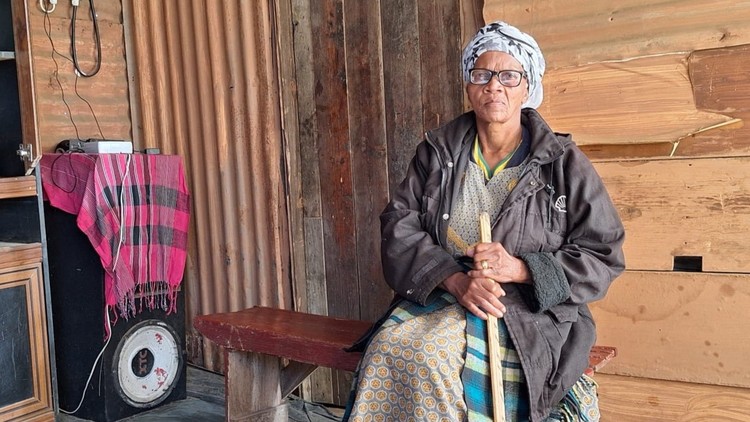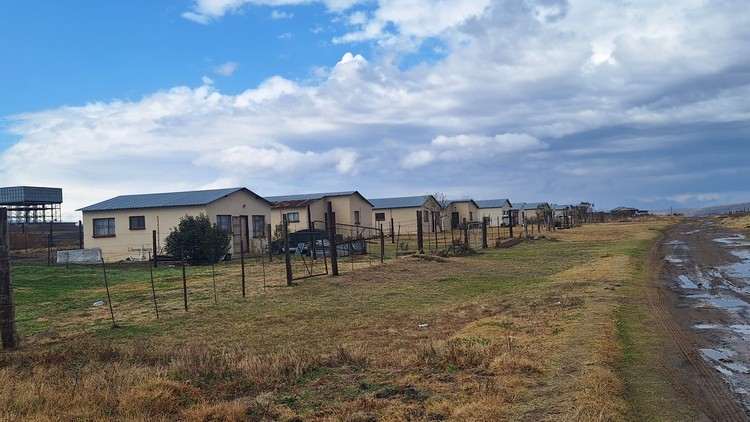Court delays leave pensioner locked out of her own home
Four years later, the unlawful occupants have still not been evicted
Jabulile Mokoena still lives in a shack because her brick-and-mortar house is unlawfully occupied. Photos: Yamkela Ntshongwana
- More than 250 houses were built in Schoonplaatz as part of a land claims settlement, but many were occupied before the rightful owners could move in.
- Jabulile Mokoena, a 71-year-old beneficiary, discovered in 2020 that someone else was living in the house allocated to her.
- Eviction proceedings have been delayed for years, and a protection order obtained by the person living in her house now prevents Mokoena from going near the property.
A 71-year-old pensioner cannot move into her government-built home in Schoonplaatz near Harrismith, Free State, because it has been occupied by another family for almost five years.
“I’m tired, frustrated, and very stressed. I had hoped that by now I would be living in my house, but I’m still stuck here,” said Jabulile Mokoena. She lives in a shack.
Mokoena’s house is one of more than 250 built as part of a land claims process for families displaced from the area in 1969.
The houses were completed in 2017, but keys were only distributed in 2020. Before the claimants could move in, many of the houses were unlawfully occupied. In March 2021, SABC News reported that the occupiers claimed it was their ancestral land.
It is unclear how many of the houses are currently unlawfully occupied. GroundUp has seen documentation proving that Mokoena is a rightful beneficiary.
Spokesperson for the Free State Department of Human Settlements Zimasa Mbewu did not respond to GroundUp’s questions about why the houses stood empty for three years before keys were handed to beneficiaries.
The department initiated eviction proceedings against the occupiers in 2021. Mbewu said the matter has been postponed several times. In March, the Free State High Court ordered Maluti-a-Phofung Municipality to file a report on alternative accommodation for the occupiers by 31 July.
Final court papers, including heads of argument, still need to be filed, and the matter will be heard in September.
But the municipality’s spokesperson, Thabo Kessah, first told GroundUp that the municipality was not aware that it had to file a report on alternative accommodation. When GroundUp pointed out that there was a court order, he said, “The municipality is currently busy with that report and will submit as required.”
Houses in Schoonplaatz built by the Free State Department of Human Settlements as part of a land claims process for families forcibly removed from the area in 1969.
Mokoena’s home is occupied by a man called Thabo Ruiters, and his family. In 2021, Mokoena went to the house, accompanied by the police, to confront Ruiters. But she left after Ruiters told her that there was an ongoing court case.
She returned two years later, in 2023, this time with her son and a few other men, and told Ruiters to move out.
Ruiters then applied for a protection order against Mokoena. In the application, Ruiters claims that Mokoena and her son threatened to hurt him if he did not vacate the house. He said that he had moved into the house with permission from a local committee of community leaders, called the Skomplaas Committee (the official name of the area is Schoonplaatz, but residents call it Skomplaas).
The Harrismith Magistrates’ Court granted the order against Mokoena, preventing her from coming near the house.
Ruiters told GroundUp this week that he had no comment, referring us to his lawyers, but did not provide details for how to reach his lawyers.
A member of the Skomplaas Committee, who asked not to be named, denied that the committee gave anyone permission to move into the house.
Wayne Alexander, acting chief director of the Land Claims Commission in the Free State, said that the commission has no role in the eviction proceedings and there is no court action challenging the validity of the original land claim. The rightful beneficiaries were identified by the Land Claims Commission and thereafter the process was handled by the Free State Department of Human Settlements, said Alexander.
Support independent journalism
Donate using Payfast

Don't miss out on the latest news
We respect your privacy, and promise we won't spam you.
Next: Huge queues outside SASSA offices in KwaMashu
Previous: Durban residents battle “sewage crisis”
Letters
Dear Editor
It's honestly disheartening to read such sad news about people taking advantage of the system.
The Municipality is to blame for this. In all my life have I not come across such an incompetent municipality.
They are so slow to react to anything. How can it take three years to give people keys? Honestly! And as for them ghosting you on this question, it's not surprising.
I wish this granny can have justice before she passes on.
© 2025 GroundUp. This article is licensed under a Creative Commons Attribution-NoDerivatives 4.0 International License.
You may republish this article, so long as you credit the authors and GroundUp, and do not change the text. Please include a link back to the original article.
We put an invisible pixel in the article so that we can count traffic to republishers. All analytics tools are solely on our servers. We do not give our logs to any third party. Logs are deleted after two weeks. We do not use any IP address identifying information except to count regional traffic. We are solely interested in counting hits, not tracking users. If you republish, please do not delete the invisible pixel.


